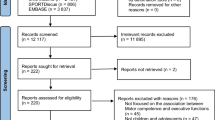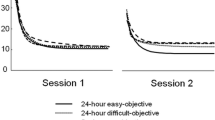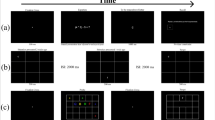Abstract
Physical movement that is meaningfully related to a cognitive task (embodiment) can enhance cognition. The current study investigates whether this effect decreases with age in childhood and young adulthood. In study 1, 7- and 9-year-olds performed a spatial 2-back task either while standing or while walking into the current stimulus field (embodied condition). Seven-year-olds profited from embodiment, while 9-year-olds did not, and boys profited more than girls. Study 2 did not detect an effect of embodiment in young adults in a spatial 3-back task. This indicates that cognitive enhancements induced by embodiment are stronger at younger ages.




Similar content being viewed by others
References
Andres, M., Olivier, E., & Badets, A. (2008). Actions, words, and numbers: a motor contribution to semantic processing? Current Directions in Psychological Science, 17, 313–317. https://doi.org/10.1111/j.1467-8721.2008.00597.x.
Ardila, A., Rosselli, M., Matute, E., & Inozemtseva, O. (2011). Gender differences in cognitive development. Developmental Psychology, 47, 984–990. https://doi.org/10.1037/a0023819.
Ashkenazi, S., Rosenberg-Lee, M., Metcalfe, A. W. S., Swigart, A. G., & Menon, V. (2013). Visuo-spatial working memory is an important source of domain-general vulnerability in the development of arithmetic cognition. Neuropsychologia, 51, 2305–2317. https://doi.org/10.1016/j.neuropsychologia.2013.06.031.
Barsalou, L. W. (2010). Grounded cognition: past, present, and future. Topics in Cognitive Sciences, 2, 716–724. https://doi.org/10.1111/j.1756-8765.2010.01115.x.
Ben-Soussan, T. D., Berkovich-Ohana, A., Piervincenzi, C., Glicksohn, J., & Carducci, F. (2015). Embodied cognitive flexibility and neuroplasticity following Quadrato Motor Training. Frontiers in Psychology, 6, 1021. https://doi.org/10.3389/fpsyg.2015.01021.
Beurskens, R., & Bock, O. (2012). Age-related deficits of dual-task walking: a review. Neural Plasticity, 2012, ID131608. https://doi.org/10.1155/2012/131608.
Boncoddo, R., Dixon, J. A., & Kelley, E. (2010). The emergence of a novel representation from action: evidence from preschoolers. Developmental Science, 13, 370–377. https://doi.org/10.1111/j.1467-7687.2009.00905.x.
Bourke, L., Davies, S. J., Sumner, E., & Green, C. (2014). Individual differences in the development of early writing skills: testing the unique contribution of visuospatial working memory. Reading and Writing, 27, 315–335. https://doi.org/10.1007/s11145-013-9446-3.
Budde, H., Voelcker-Rehage, C., Pietraßyk-Kendziorra, S., Ribeiro, P., & Tidow, G. (2008). Acute coordinative exercise improves attentional performance in adolescents. Neuroscience Letters, 441, 219–223. https://doi.org/10.1016/j.neulet.2008.06.024.
Chang, Y. K., Labban, J. D., Gapin, J. I., & Etnier, J. L. (2012). The effects of acute exercise on cognitive performance: a meta-analysis. Brain Research, 1453, 87–101. https://doi.org/10.1016/j.brainres.2012.02.068.
Cohen, R. L. (1983). The effect of encoding variables on the recall of words and action events. Memory and Cognition, 11, 575–582. https://doi.org/10.3758/BF03198282.
Davranche, K., Audiffren, M., & Denjean, A. (2006). A distributional analysis of the effect of physical exercise on a choice reaction time task. Journal of Sports Sciences, 24, 323–329. https://doi.org/10.1080/02640410500132165.
Diamond, A. (2000). Close interrelation of motor development and cognitive development and of the cerebellum and prefrontal cortex. Child Development, 71, 44–56. https://doi.org/10.1111/1467-8624.00117.
Diamond, A. (2013). Executive functioning. Annual Review of Psychology, 64, 135–168. https://doi.org/10.1146/annurev-psych-113011-143750.
Drollette, E. S., Scudder, M. R., Raine, L. B., Moore, R. D., Saliba, B. J., Pontifex, M. B., & Hillman, C. (2014). Acute exercise facilitates brain function and cognition in children who need it most: an ERP study of individual differences in inhibitory control capacity. Developmental Cognitive Neuroscience, 7, 53–64. https://doi.org/10.1016/j.dcn.2013.11.001.
Eaton, W. O., & Enns, L. R. (1986). Sex differences in human motor activity level. Psychological Bulletin, 1, 19–28. https://doi.org/10.1037/0033-2909.100.1.19.
Engelkamp, J., & Zimmer, H. (1989). Memory for actions: a new field of research. Psychological Research, 51, 153–157. https://doi.org/10.1007/BF00309142.
Engelkamp, J., & Zimmer, H. D. (1997). Sensory factors in memory for subject-performed tasks. Acta Psychologica, 96, 43–60. https://doi.org/10.1016/S0001-6918(97)00005-X.
Feldman, A., & Acredolo, L. (1979). The effect of active versus passive exploration on memory for spatial location in children. Child Development, 50, 698–704. https://doi.org/10.2307/1128935.
Fischer, U., Moeller, K., Bientzle, M., Cress, U., & Nuerk, H.-C. (2011). Sensori-motor spatial training of number magnitude representation. Psychonomic Bulletin & Review, 18, 177–183. https://doi.org/10.3758/s13423-010-0031-3.
Frick, A., Daum, M. M., Walser, S., & Mast, F. W. (2009). Motor processes in children’s mental rotation. Journal of Cognition and Development, 10, 18–40. https://doi.org/10.1080/15248370902966719.
Geary, D. C. (2008). An evolutionarily informed education science. Educational Psychologist, 43, 179–195. https://doi.org/10.1080/00461520802392133.
Goldin-Meadow, S., Nusbaum, H., Kelly, S. D., & Wagner, S. (2001). Explaining math: gesturing lightens the load. Psychological Science, 12, 516–522. https://doi.org/10.1111/1467-9280.00395.
Guttentag, R. W. (1996). Mental effort and motivation: influences on children’s memory strategy use. In F. Weinert & W. Schneider (Eds.), Research on memory development: state of the art and future directions. Hillsdale: L. Erlbaum.
Hainselin, M., Picard, L., Manolli, P., Vankerkore-Candas, S., & Bourdin, B. (2017). Hey teacher, don’t leave them kids alone: action is better for memory than reading. Frontiers in Psychology, 8, 325. https://doi.org/10.3389/fpsyg.2017.00325.
Hillman, C. H., Kamijo, K., & Scudder, M. R. (2012). A review of chronic and acute physical activity participation on neuroelectric measures of brain health and cognition during childhood. Preventive Medicine, 52S, S21–S28. https://doi.org/10.1016/j.ypmed.2011.01.024.
Hillman, C., Pontifex, M. B., Castelli, D. M., Khan, N. A., Raine, L. B., Scudder, M. R., … Kamijo, K. (2014). Effects of the FITKids randomized controlled trial on executive control and brain function. Pediatrics, 134, e1063-e 1071. doi:https://doi.org/10.1542/peds.2013-3219.
Huxhold, O., Li, S.-C., Schmiedek, F., & Lindenberger, U. (2006). Dual-tasking postural control: aging and the effects of cognitive demand in conjunction with focus of attention. Brain Research Bulletin, 69, 294–305. https://doi.org/10.1016/j.brainresbull.2006.01.002.
Jahn, P., & Engelkamp, J. (2003). Design effects in prospective and retrospective memory for actions. Experimental Psychology, 50, 4–15. https://doi.org/10.1027//1618-3169.50.1.4.
Jansen, P., & Kellner, J. (2015). The role of rotational hand movements and general motor ability in children’s mental rotation performance. Frontiers in Psychology, 6, 984. https://doi.org/10.3389/fpsyg.2015.00984.
Janssen, M., Toussaint, H. M., van Mechelen, W., & Verhagen, E. (2014). Effects of acute bouts of physical activity on children’s attention: a systematic review of the literature. Springer Plus, 3, 410–420. https://doi.org/10.1186/2193-1801-3-410.
Kontra, C., Goldin-Meadow, S., & Beilock, S. L. (2012). Embodied learning across the lifespan. Topics in Cognitive Science, 10, 1–9. https://doi.org/10.1111/j.1756-8765.2012.01221.x.
Koziol, L. F., Budding, D. E., & Chidekel, D. (2011). From movement to thought: executive function, embodied cognition, and the cerebellum. Cerebellum, 11, 505–525. https://doi.org/10.1007/s12311-011-0321-y.
Lehrl, S., Merz, J., Burkhard, G., & Fischer, S. (1991). Manual zum MWT-A. Erlangen: Perimed Fachbuch Verlag.
Li, S.-C., Lindenberger, U., Hommel, B., Aschersleben, G., Prinz, W., & Baltes, P. B. (2004). Transformations in the couplings among intellectual abilities and constituent cognitive processes across the life span. Psychological Science, 15, 155–163. https://doi.org/10.1111/j.0956-7976.2004.01503003.x.
Link, T., Moeller, K., Huber, S., Fischer, U., & Nuerk, H.-C. (2013). Walk the number line—an embodied training of numerical concepts. Trends in Neurosciences and Education, 2, 74–84. https://doi.org/10.1016/j.tine.2013.06.005.
Loeffler, J., Raab, M., & Canal-Bruland, R. (2016). A lifespan perspective on embodied cognition. Frontiers in Psychology, 7, 1–6. https://doi.org/10.3389/fpsyg.2016.00845.
Mavilidi, M.-F., Okely, A. D., Chandler, P., & Paas, F. (2016). Infusing physical activities into the classroom: effects on preschool children’s geography learning. Mind, Brain, and Education, 10, 256–263. https://doi.org/10.1111/mbe.12131.
Mavilidi, M.-F., Okely, A. D., Chandler, P., & Paas, F. (2017). Effects of integrating physical activities into a science lesson on preschool children’s learning and enjoyment. Applied Cognitive Psychology, 31, 281. https://doi.org/10.1002/acp.3325.
McKenna, R., Rushe, T., & Woodcock, K. A. (2017). Informing the structure of executive function in children: a meta-analysis of functional neuroimaging data. Frontiers in Human Neuroscience, 11, 154. https://doi.org/10.3389/fnhum.2017.00154.
McMorris, T. (2016). Exercise–cognition interactions: neuroscience perspectives. New York City: Elsevier.
McMorris, T., & Graydon, J. (2000). The effect of incremental exercise on cognitive performance. International Journal of Sport Psychology, 31, 66–81.
Mondschein, E. R., Adolph, K. E., & Tamis-LeMonda, C. S. (2000). Gender bias in mothers’ expectations about infant crawling. Journal of Experimental Child Psychology, 77, 304–316. https://doi.org/10.1006/jecp.2000.2597.
Moreau, D. (2015). Unreflective actions? Complex motor skill acquisition to enhance spatial cognition. Phenomenology and the Cognitive Sciences, 14, 349–359. https://doi.org/10.1007/s11097-014-9376-9.
Moreau, D., & Conway, A. R. A. (2014). The case for an ecological approach to cognitive training. Trends in Cognitive Sciences, 18, 334–336. https://doi.org/10.1016/j.tics.2014.03.009.
Moreau, D., Morrison, A. B., & Conway, A. R. A. (2015). An ecological approach to cognitive enhancement: complex motor training. Acta Psychologica, 157, 44–55. https://doi.org/10.1016/j.actpsy.2015.02.007.
Nelson, C. A., Monk, C. S., Lin, J., Carver, L. J., Thomas, K. M., & Truwit, C. L. (2000). Functional neuroanatomy of spatial working memory in children. Developmental Psychology, 36, 109–116. https://doi.org/10.1037/0012-1649.36.1.109.
Paas, F., & Sweller, J. (2012). An evolutionary upgrade of cognitive load theory: using the human motor system and collaboration to support the learning of complex cognitive tasks. Educational Psychology Review, 24, 27–45. https://doi.org/10.1007/s10648-011-9179-2.
Pesce, C. (2012). Shifting the focus from quantitative to qualitative exercise characteristics in exercise and cognition research. Journal of Sport and Exercise Psychology, 34, 766–786. https://doi.org/10.1123/jsep.34.6.766.
Pesce, C., & Ben-Soussan, T. D. (2016). “Cogito ergo sum” or “ambulo ergo sum”? New perspectives in developmental exercise and cognition research. In T. McMorris (Ed.), Exercise–cognition interaction: neuroscience perspectives (pp. 251–282). Amsterdam: Academic Press.
Pesce, C., Croce, R., Ben-Soussan, T. D., Vazou, S., McCullick, B., Tomporowski, P., & Horvat, M. (2016). Variability of practice as an interface between motor and cognitive development. International Journal of Sport and Exercise Psychology. https://doi.org/10.1080/1612197X.2016.1223431.
Petermann, F., & Petermann, U. (2010). HAWIK IV (3rd ed.). Bern: Huber.
Piaget, J. (1975). L'équilibration des structures cognitives- problème central du développement. Paris: Presses Universitaires de France.
Pickering, S. J. (2010). The development of visual–spatial working memory. Memory, 9, 423–432. https://doi.org/10.1080/096582101430000182.
Pouw, W. T. J. L., van Gog, T., & Paas, F. (2014). An embedded and embodied cognition review of instructional manipulatives. Educational Psychology Review, 26, 51–72. https://doi.org/10.1007/s10648-014-9255-5.
Rosenbaum, D. A. (2005). The Cinderella of psychology: the neglect of motor control in the science of mental life and behavior. American Psychologist, 60, 308–317. https://doi.org/10.1037/0003-066.X.60.4.308.
Sallis, J. F., Prochaska, J. O., & Taylor, W. C. (2000). A review of correlates of physical activity of children and adolescents. Medicine and Science in Sports and Exercise, 32, 963–975. https://doi.org/10.1097/00005768-200005000-00014.
Schaefer, S. (2014). The ecological approach to cognitive–motor dual-tasking: findings on the effects of expertise and age. Frontiers in Psychology, 5, 1–9. https://doi.org/10.3389/fpsyg.2014.01167.
Schaefer, S., Krampe, R. T., Lindenberger, U., & Baltes, P. B. (2008). Age differences between children and young adults in the dynamics of dual-task prioritization: body (balance) versus mind (memory). Developmental Psychology, 44, 747–757. https://doi.org/10.1037/0012-1649.44.3.747.
Schaefer, S., Lövdén, M., Wieckhorst, B., & Lindenberger, U. (2010). Cognitive performance is improved while walking: differences in cognitive-sensorimotor couplings between children and young adults. The European Journal of Developmental Psychology, 7, 371–389. https://doi.org/10.1037/0012-1649.44.3.747.
Schaefer, S., Jagenow, D., Verrel, J., & Lindenberger, U. (2015). The influence of cognitive load and walking speed on gait regularity in children and young adults. Gait and Posture, 41, 258–262. https://doi.org/10.1016/j.gaitpost.2014.10.013.
Schmiedek, F., Lövdén, M., & Lindenberger, U. (2010). Hundred days of cognitive training enhance broad cognitive abilities in adulthood: findings from the COGITO study. Frontiers in Aging Neuroscience, 2, 1–10. https://doi.org/10.3389/fnagi.2010.00027.
Schneider, W., & Sodian, B. (1997). Memory strategy development: lessons from longitudinal research. Developmental Review, 17, 442–461. https://doi.org/10.1006/drev.1997.0441.
Sjöwall, D., Hertz, M., & Klingberg, T. (2017). No long-term effect of physical activity intervention on working memory or arithmetic in preadolescents. Frontiers in Psychology, 8, 1342. https://doi.org/10.3389/fpsyg.2017.01342.
Soto, C. (2016). The little six personality dimensions from early childhood to early adulthood: mean-level age and gender differences in parents’ reports. Journal of Personality, 84, 409–421. https://doi.org/10.1111/jopy.12168.
Thelen, E. (2000). Motor development as foundation and future of developmental psychology. International Journal of Behavioral Development, 24, 385–397. https://doi.org/10.1080/016502500750037937.
Thomas, J. R., & French, K. E. (1985). Gender differences across age in motor performance: a meta-analysis. Psychological Bulletin, 98, 260–282. https://doi.org/10.1037/0033-2909.98.2.260.
Thomas, K. M., King, S. W., Franzen, P. L., Welsh, T. F., Berkowitz, A. L., Noll, D. C.,. ... Casey, V. B. (1999). A developmental functional MRI study of spatial working memory. NeuroImage, 10, 327–338. doi: https://doi.org/10.1006/nimg.1999.0466.
Tomporowski, P. D. (2003). Effects of acute bouts of exercise on cognition. Acta Psychologica, 112, 297–324. https://doi.org/10.1016/S0001-6918(02)00134-8.
Tomporowski, P. D., Davis, C. L., Miller, P. H., & Naglieri, J. A. (2008). Exercise and children’s intelligence, cognition, and academic achievement. Educational Psychology Review, 20, 111–131. https://doi.org/10.1007/s10648-007-9057-0.
Vazou, S., & Smiley-Oyen, A. (2014). Moving and academic learning are not antagonists: acute effects on executive functions and enjoyment. Journal of Sport and Exercise Psychology, 36, 474–485. https://doi.org/10.1123/jsep.2014-0035.
Verghese, J., Kuslansky, G., Holtzer, R., Katz, M., Xue, X., Buschke, H., & Pahor, M. (2007). Walking while talking: effect of task prioritization in the elderly. Archives of Physical and Medical Rehabilitation, 88, 50–53. https://doi.org/10.1016/j.apmr.2006.10.007.
Verrel, J., Lövdén, M., Schellenbach, M., Schaefer, S., & Lindenberger, U. (2009). Interacting effects of cognitive load and adult age on the regularity of whole-body motion during treadmill walking. Psychology and Aging, 24, 75–81. https://doi.org/10.1037/a0014272.
Wechsler, D. (1981). Wechsler adult intelligence scale—revised (WAIS-R). New York: Psychological Corporation.
Wilson, M. (2002). Six views of embodied cognition. Psychonomic Bulletin & Review, 9, 625–636. https://doi.org/10.3758/BF03196322.
Winter, B., Breitenstein, C., Mooren, F. C., Voelker, K., Fobker, M., Lechtermann, A.,. ... Knecht, S. (2007). High impact running improves learning. Neurobiology of Learning and Memory, 87, 597–609. doi: https://doi.org/10.1016/j.nlm.2006.11.003.
Wollesen, B., & Voelcker-Rehage, C. (2014). Training effects on motor–cognitive dual-task performance in older adults: a systematic review. European Review of Aging and Physical Activity, 11, 5–24. https://doi.org/10.1007/s11556-013-0122-z.
Woollacott, M., & Shumway-Cook, A. (2002). Attention and the control of posture and gait: a review of an emerging area of research. Gait and Posture, 16, 1–14. https://doi.org/10.1016/S0966-6362(01)00156-4.
Acknowledgements
Study 1: I thank Manuel Zellhöfer for programming the experimental task, and Julius Verrel, Whitney Cole, Ulman Lindenberger, and Gianluca Amico for helpful discussions. I also would like to thank Gabriele Faust, Sascha Ketelhut, Antonia Kaiser, Elisabeth Klose, and Pina Keller for their help with data collection.
Study 2: I thank Corinna Lobensteiner and Anne-Kathrin Langner for their help with data collection and for helpful discussions, and Sascha Geidel for his help with the experimental set-up.
I thank two anonymous reviewers for their helpful comments.
Funding
This work was supported by the Max Planck Institute for Human Development in Berlin and by Leipzig University.
Author information
Authors and Affiliations
Corresponding author
Ethics declarations
Conflict of Interest
The author declares that she has no conflict of interest.
Additional information
The first study was carried out at the Max Planck Institute for Human Development in Berlin and the second study at the Leipzig University.
Rights and permissions
About this article
Cite this article
Schaefer, S. Embodiment Helps Children Solve a Spatial Working Memory Task: Interactions with Age and Gender. J Cogn Enhanc 3, 233–244 (2019). https://doi.org/10.1007/s41465-018-0081-4
Received:
Accepted:
Published:
Issue Date:
DOI: https://doi.org/10.1007/s41465-018-0081-4




